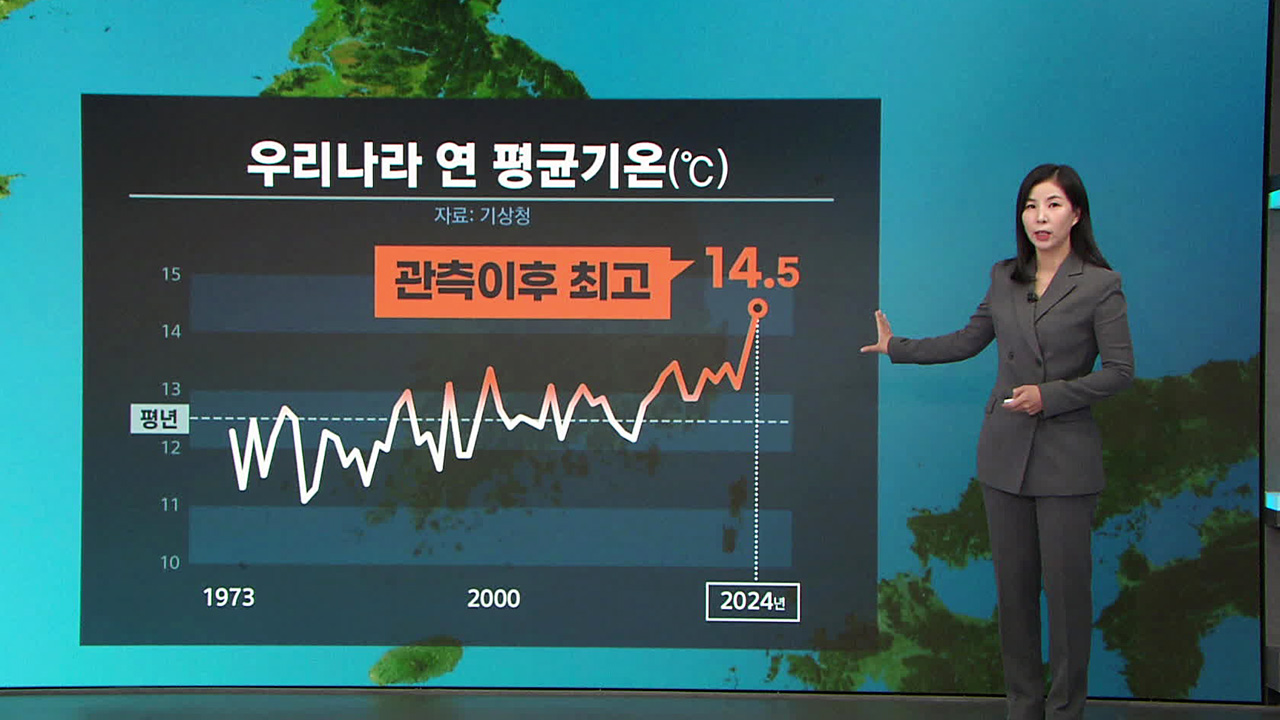[Anchor]
The biggest cause of this climate crisis is considered to be global warming.
In fact, last year was the hottest year on record.
The problem is that carbon emissions, which lead to warming, are not decreasing.
Next, we have a report from meteorologist Kim Min-kyung.
[Report]
As global warming has become serious, UN member countries established what is called the 'climate red line' in 2015.
They agreed to limit the rise in global temperatures to 1.5 degrees compared to pre-industrial levels, starting from the period when carbon emissions began to surge due to industrialization.
However, this red line was first broken last year.
The Korean Peninsula also experienced its hottest year on record.
The average temperature last year was 14.5 degrees, the highest since weather observations began.
The number of tropical nights reached 24.5 days, setting a record, which was more than three times the average year, making it unprecedented.
In the waters near the Korean Peninsula, high sea temperatures persisted throughout last year, with an average sea temperature of 18.6 degrees, the highest on record.
Globally and on the Korean Peninsula, as well as in the oceans, it was the hottest ever.
In other words, the Earth is literally boiling, but carbon emissions, one of the main causes of warming, are not decreasing.
As of 2023, global greenhouse gas emissions reached 57.1 billion tons, the highest ever recorded.
Experts estimate that last year's emissions were also higher than the previous year.
Despite international efforts, greenhouse gas emissions have continued to rise, except for around 2020 when the economy was halted due to COVID-19.
This is KBS News, Kim Min-kyung.
The biggest cause of this climate crisis is considered to be global warming.
In fact, last year was the hottest year on record.
The problem is that carbon emissions, which lead to warming, are not decreasing.
Next, we have a report from meteorologist Kim Min-kyung.
[Report]
As global warming has become serious, UN member countries established what is called the 'climate red line' in 2015.
They agreed to limit the rise in global temperatures to 1.5 degrees compared to pre-industrial levels, starting from the period when carbon emissions began to surge due to industrialization.
However, this red line was first broken last year.
The Korean Peninsula also experienced its hottest year on record.
The average temperature last year was 14.5 degrees, the highest since weather observations began.
The number of tropical nights reached 24.5 days, setting a record, which was more than three times the average year, making it unprecedented.
In the waters near the Korean Peninsula, high sea temperatures persisted throughout last year, with an average sea temperature of 18.6 degrees, the highest on record.
Globally and on the Korean Peninsula, as well as in the oceans, it was the hottest ever.
In other words, the Earth is literally boiling, but carbon emissions, one of the main causes of warming, are not decreasing.
As of 2023, global greenhouse gas emissions reached 57.1 billion tons, the highest ever recorded.
Experts estimate that last year's emissions were also higher than the previous year.
Despite international efforts, greenhouse gas emissions have continued to rise, except for around 2020 when the economy was halted due to COVID-19.
This is KBS News, Kim Min-kyung.
■ 제보하기
▷ 카카오톡 : 'KBS제보' 검색, 채널 추가
▷ 전화 : 02-781-1234, 4444
▷ 이메일 : kbs1234@kbs.co.kr
▷ 유튜브, 네이버, 카카오에서도 KBS뉴스를 구독해주세요!
- Earth breaches warming limit
-
- 입력 2025-01-11 23:37:03

[Anchor]
The biggest cause of this climate crisis is considered to be global warming.
In fact, last year was the hottest year on record.
The problem is that carbon emissions, which lead to warming, are not decreasing.
Next, we have a report from meteorologist Kim Min-kyung.
[Report]
As global warming has become serious, UN member countries established what is called the 'climate red line' in 2015.
They agreed to limit the rise in global temperatures to 1.5 degrees compared to pre-industrial levels, starting from the period when carbon emissions began to surge due to industrialization.
However, this red line was first broken last year.
The Korean Peninsula also experienced its hottest year on record.
The average temperature last year was 14.5 degrees, the highest since weather observations began.
The number of tropical nights reached 24.5 days, setting a record, which was more than three times the average year, making it unprecedented.
In the waters near the Korean Peninsula, high sea temperatures persisted throughout last year, with an average sea temperature of 18.6 degrees, the highest on record.
Globally and on the Korean Peninsula, as well as in the oceans, it was the hottest ever.
In other words, the Earth is literally boiling, but carbon emissions, one of the main causes of warming, are not decreasing.
As of 2023, global greenhouse gas emissions reached 57.1 billion tons, the highest ever recorded.
Experts estimate that last year's emissions were also higher than the previous year.
Despite international efforts, greenhouse gas emissions have continued to rise, except for around 2020 when the economy was halted due to COVID-19.
This is KBS News, Kim Min-kyung.
The biggest cause of this climate crisis is considered to be global warming.
In fact, last year was the hottest year on record.
The problem is that carbon emissions, which lead to warming, are not decreasing.
Next, we have a report from meteorologist Kim Min-kyung.
[Report]
As global warming has become serious, UN member countries established what is called the 'climate red line' in 2015.
They agreed to limit the rise in global temperatures to 1.5 degrees compared to pre-industrial levels, starting from the period when carbon emissions began to surge due to industrialization.
However, this red line was first broken last year.
The Korean Peninsula also experienced its hottest year on record.
The average temperature last year was 14.5 degrees, the highest since weather observations began.
The number of tropical nights reached 24.5 days, setting a record, which was more than three times the average year, making it unprecedented.
In the waters near the Korean Peninsula, high sea temperatures persisted throughout last year, with an average sea temperature of 18.6 degrees, the highest on record.
Globally and on the Korean Peninsula, as well as in the oceans, it was the hottest ever.
In other words, the Earth is literally boiling, but carbon emissions, one of the main causes of warming, are not decreasing.
As of 2023, global greenhouse gas emissions reached 57.1 billion tons, the highest ever recorded.
Experts estimate that last year's emissions were also higher than the previous year.
Despite international efforts, greenhouse gas emissions have continued to rise, except for around 2020 when the economy was halted due to COVID-19.
This is KBS News, Kim Min-kyung.
-
-

김민경 기자 minkyung@kbs.co.kr
김민경 기자의 기사 모음
-
이 기사가 좋으셨다면
-
좋아요
0
-
응원해요
0
-
후속 원해요
0











![[단독] 경호처 내부망에 “영장 막으면 위법”…경호차장이 ‘삭제’ 지시](/data/layer/904/2025/01/20250111_P6Paxp.jpg)



이 기사에 대한 의견을 남겨주세요.